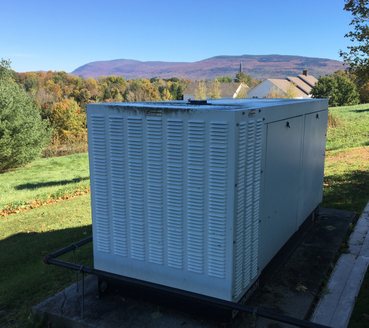Featuring Allison Murphy, Water System Specialist in the Department of Environmental Conservation

When the power goes out, Allison Murphy thinks more about the faucets than the lights. That’s because Allison is spear-heading a brand-new initiative aimed at delivering backup generators to public drinking water systems with a focus on the systems serving sensitive populations including hospitals, homeless shelters, eldercare facilities schools, and communities that deliver safe drinking water to thousands of users. The goal is to make sure these critical facilities have running water when there’s a power outage.
The initiative, called the Standby Power Initiative, is a partnership between the Department of Environmental Conservation (DEC) and the Department of Public Safety (DPS). It’s designed to get standby power equipment to public drinking water system infrastructure that may lose the ability to supply water when the power goes out.
Many of us can relate. If you’ve ever lived in a house with a well and a well pump, it can be frustrating and downright disgusting when the water pump goes out during a storm. Try multiplying this problem by ten or twenty, and you’ll get a better idea of the scale of the problem small shelters face without water.
 “Through a combination of the Drinking Water State Revolving Fund set-asides and Federal Emergency Management Hazard Mitigation Grant Program grants, we’re hoping to offer up to 75% reimbursement to these public drinking water systems, allowing them to install standby power equipment. This money is critical. A generator for a water system can range from $1,000 to more than $100,000. The majority of Vermont’s public community drinking water systems serve 500 people or less; they don’t benefit from the economy of scale advantages that larger systems do. We’re trying to tip those scales to make installing standby power equipment economically feasible for them.”
“Through a combination of the Drinking Water State Revolving Fund set-asides and Federal Emergency Management Hazard Mitigation Grant Program grants, we’re hoping to offer up to 75% reimbursement to these public drinking water systems, allowing them to install standby power equipment. This money is critical. A generator for a water system can range from $1,000 to more than $100,000. The majority of Vermont’s public community drinking water systems serve 500 people or less; they don’t benefit from the economy of scale advantages that larger systems do. We’re trying to tip those scales to make installing standby power equipment economically feasible for them.”
Allison adds that her primary goal is, “to make sure that emergency shelters and other facilities caring for sensitive populations such as elder care facilities have safe, reliable sources of water.” For her, it’s all about protecting public health, the environment, and the most vulnerable.
Thanks to Allison’s collaborative efforts with Lauren Oates (DPS) and Kim Mckee (DEC) and support from DEC’s Drinking Water and Groundwater Protection Division team, she’s been able to figure out a way to help public drinking water systems affordably install standby power equipment. With more intense storms on the way thanks to climate change, having a secure water system can make all the difference.
To learn more about this program and many other drinking water initiatives, visit the Capacity Development Program’s webpage. If you would like to help spread the word about the importance of drinking water, consider volunteering at the upcoming Drinking Water Fair on May 11 at the Ethan Allen Homestead in Burlington (contact The Vermont Drinking Water Week committee for more information at vermontdrinkingwaterweek@gmail.com).
